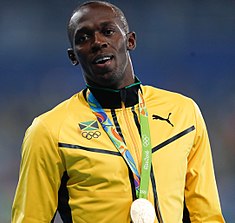On a murky evening in New York City, 21-year-old Usain Bolt towers over his competition even when stooped in his blocks awaiting starter’s orders.
Alongside him is Tyson Gay, reigning world champion over 100 and 200-meters, but something incredible was so clearly in the making when the rangy, 6’5” Bolt began to break clear at the 20-meter mark of the 2008 Reebok Grand Prix.
His long legs are a hindrance out of the blocks, but once they carry him to his top speed of almost 28mph he is leagues above the rest. The world did not quite know it yet, but nobody catches up to Usain Bolt.
As he ruthlessly extends his lead, world-class rival Gay is left staring at a clean pair of heels and a trackside timer which stopped at 9.71 seconds. The time would later be corrected to 9.72 but the result did not change, Bolt had just become the fastest man in history.
Weeks later, Bolt would capture the hearts and minds of virtually the entire world at the Beijing Olympics where he won his first clean sweep of gold medals. Indeed, that was where the main part of Bolt’s movie began, but the unorthodox lead-up, capped off by that scintillating performance in New York, is just as important.
Becoming Lightning Bolt
Not many 100-meter sprinters are two meters tall. With a race that often begins and ends in under ten seconds, explosivity and acceleration are paramount, with top speed only coming into play more than halfway down the track.
As such, Bolt was a born and bred 200-meter runner, smashing the world junior record in 2004 with a stunning sub-20 second time.
It is a little-known fact that the Jamaican competed at the 2004 Olympic Games in Athens, nursing a slight hamstring injury while failing to keep up with a fairly average field in his 200-meter heat.
That disappointment aside, such a stunning performance at the World Junior Championships was enough to convince many experts that Bolt was destined for success, but few could have predicted the sheer domination he would eventually wield over the shorter distance.
As uncovered by Michael Johnson’s BBC documentary, The Fastest Man Who Has Ever Lived, Bolt is, by his own admission, a lazy trainer.
The young Jamaican constantly lobbied his coach Glen Mills to let him run the hundred, which came with a lighter training schedule, until the pair settled on a wager; if Bolt broke the national 200-meter record, he would finally get his shot.
At the 2007 Jamaican Championships, Bolt did just that, eclipsing a record set by sprinting legend Don Quarrie in 1971. According to the Jamaica Gleaner, his response was simply “When is the 100m?”

Three weeks later, the man who would go on to be labelled ‘Lightning Bolt’ ran his first ever competitive 100-meters in Crete, posting a promising but unremarkable time of 10.03 seconds.
Then, things caught fire. In just his third race he came within 0.02 seconds of Asafa Powell’s world record, posting a 9.76 at the Jamaica International Invitation in Kingston, a time that would have easily taken any Olympic final in history.
The most hard-nosed critics were sceptical of that time’s legitimacy given Bolt romped home a full 0.32 seconds ahead of his nearest challenger on the night. How could anyone blame them? On what planet could this genetic anomaly come so close to the fastest time in history in just his third competitive 100-meter race?
Weeks later, Bolt had his arms spread wide as he powered round the corner in New York, leaving a world-class field obliterated in his wake.
The new world record holder had made history in just his fourth competitive 100-meters at a meeting few outside the athletics world would have watched, but it ensured his name was on everybody’s lips heading towards the big stage in Beijing.
Perhaps there has never been an athlete more suited to the global limelight. When the camera pointed his way, he was in his element. When he danced on the start-line or crouched into his signature lightning bolt pose, the crowd erupted. When he put his finger to his lips and zoned in mere seconds before the starter’s gun, the crowd fell silent. Beijing was the Bolt show, all other athletes were the supporting cast.
After jogging through his heat and semi-final in the same way anyone else might do when flashed across the road by a waiting car, the Jamaican was ready to put on a show for the Olympic final.
Almost a carbon copy of his record in New York one month prior, Bolt powered away from the pack, bursting into celebration a full 25-meters before the finish line, beating his chest once and taking care not to trip over his untied shoelace as he broke his own world record.
In New York he announced himself to the sporting world, in Beijing he announced himself to the world. Six days later he would round off Beijing with three gold medals and three world records, adding the 200-meters and 4×100-meter relay to his budding collection.
Of course, what Bolt went onto achieve in London, Rio de Janeiro and particularly Berlin, where his world records of 9.58 and 19.19 still stand today, will forever be etched in history. Indeed, so will his first world record in New York, although you might have to look further down the page.
On 31st May, we remember the 13th anniversary of Bolt’s first 100-meter masterclass which, if his coach got his wish, almost didn’t happen at all.